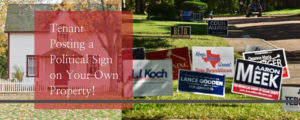26 Jun Tenant Posting a Political Sign on Your Property
California Civil Code §1940.4 establishes the rights and obligations of both residential tenants and landlords regarding political signs on rented property. Tenant posting a political sign on your property is allowed when:
- An election or legislative vote, including an election of a candidate to public office.
- The initiative, referendum, or recall process.
- Issues that are before a public commission, public board, or elected local body for a vote.
What are cases where a tenant posting a political sign on your property is prohibited?
Under CC §1940.4(c), a landlord may prohibit a tenant from posting or displaying political signs in the following circumstances:
- The political sign is more than six-square-feet in size.
- The posting or displaying would violate a local, state, or federal law.
- The posting or displaying would violate a lawful provision in a common interest development governing a document that satisfies the criteria of CC §1353.6.
Political signs may be posted or displayed in the window or on the door of the premises leased by the tenant in a multifamily dwelling, or from the yard, window, door, balcony, or outside wall of the premises leased by a tenant of a single-family dwelling.
Tenants still must comply with local city or county ordinances of how long the signs can be displayed, and when the signs must be removed. If a local ordinance addressing display or posting of such signs does not exist, the landlord may establish rules with reasonable time limits on how long the tenant can display the signs and when the signs should be removed by the tenant. A reasonable time period for this purpose shall begin at least 90 days prior to the date of the election or vote to which the sign relates and end at least 15 days following the date of the election or vote.
Contact the Law Office of Aaron Kohanim today to schedule a consultation. You can call us at (310) 861-7506. If you prefer to send a quick message, visit our Contact Us page.
The response above is not intended as legal advice. This response does not create an attorney-client relationship. Legal questions can only be fully answered through consultation with an attorney to whom you give full and accurate details. It is highly recommended that you seek advice from an attorney licensed in your jurisdiction by setting up a confidential meeting. All who read this answer should not rely on the answer to govern their conduct.




Sorry, the comment form is closed at this time.